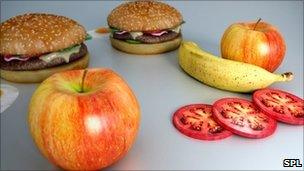Q&A: The Food Standards Agency
- Published

The FSA aims to help people eat more healthily
The government has announced a shake-up of the Food Standards Agency, the watchdog set up to protect the public's health and consumer interests in relation to food.
What is the FSA?
The Food Standards Agency is an independent food safety watchdog set up to protect the public's health and consumer interests in relation to food.
It was proposed in 1997, amid concerns about food poisoning, intensive farming methods and BSE.
Food policy experts wanted a new food agency responsible to the Secretary of State for Health, independent of the food industry, with an open information policy and at "arms-length" from ministers.
The agency eventually came into force in April 2000.
It has over 2,000 staff and an annual budget of £135m.
How does it work?
The FSA is accountable to Parliament through health ministers, and to the devolved administrations in Scotland, Wales and Northern Ireland for its activities within their areas.
What work has it done?
In its time, the body has been credited with raising awareness of good eating habits and persuaded food manufacturers to reduce their use of salt.
Campaigns have included pushing for stricter rules on TV advertising to children of junk foods, a mass recall of foods containing the dye Sudan I, and restrictions on the sheep trade following the 1986 Chernobyl disaster.
What will the changes mean?
The FSA will hand over some of its current responsibilities to government and instead focus solely on food safety policy and enforcement.
The Department of Health will oversee nutrition policy and the Department for Environment, Food and Rural Affairs will handle food labelling.
The Government says that the reorganisation will contribute to its objectives to improve efficiency, and is "paramount to the key priority of improving the health of the nation by creating a public health service".
Around 70 policy posts will move to the Department of Health and 25 will move to Defra from the FSA.